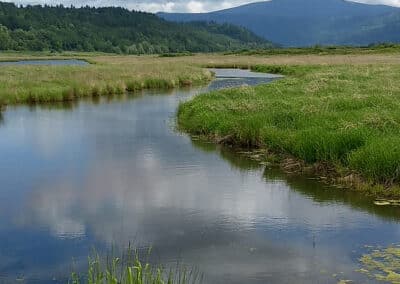Puget Sound Nutrient Problem: Chapter 1
In Which the Agencies Study the Problem . . . “to Death”
by Nina Bell • February 1, 2020
This is the first in a series of chapters about how an agency can manage to do nothing while assuring the public that it is busy doing its job, in this case to protect and restore Puget Sound. Well, it’s unfair to say that the Washington Department of Ecology literally has done nothing about nutrient pollution in Puget Sound.  You do have to give them credit for a lot of studies, and those studies are important.  Â
In fact, those studies show that Ecology’s years of failure to regulate pollution are harming Puget Sound and that it will get worse.  Somehow, I don’t think that’s what they are trying to prove. Â
But they do love their studies. When you look at the “recommendations†section in an Ecology study, you can count on the fact that the agency will always recommend—wait for it—more studies.  Well, granted, there can never be enough scientific information, but the point of our state and federal environmental laws is to act to protect human health and the environment, not to produce studies.  Â
And so, after nearly 20 years, all those Ecology studies show us that nutrient pollution (nitrogen, phosphorus, carbon) is disrupting the food web in Puget Sound, lowering the dissolved oxygen needed by aquatic life, and causing ever-increasing algal blooms that are sometimes toxic and sometimes smother beaches.  Just another day in Cascadia Paradise.Â
In its studies, Ecology has long shown that the majority of this nutrient pollution is coming from treated sewage discharged by cities.  Ecology has determined that the projected increase of another 1.8 million people to the region’s existing 4.5 million population will result in a 40 increase of the nitrogen pollution that is already harming Puget Sound.  “Crickets†on that regulation thing.Â
And, if you care about Puget Sound, you might be heartened to know that one of Ecology’s studies has demonstrated that if the agency were to require cities to remove nutrient pollution from treated sewage, a side benefit would be preventing the discharge of some of the estimated 97,000 pounds of unregulated toxic pollutants such as pharmaceuticals and personal care products that are discharged each year by the region’s cities. You know, pollutants that are having a negative impact on the health of Puget Sound chinook and endangered orca whales.  Â
Actually, you would think that, in light of all these findings, Ecology would have pushed the big flashing red button labeled “Urgent: Regulation Needed ASAP to Save Puget Soundâ€Â but, no. Instead, Ecology continues to putter along, nothing to see here, nothing to get too excited about, nothing to regulate. Oh, but there is one thing we can be sure they will want to do: another study!Â
Stay tuned for Chapter 2, In Which Washington Ecology Refuses to Issue Legal Discharge Permits



